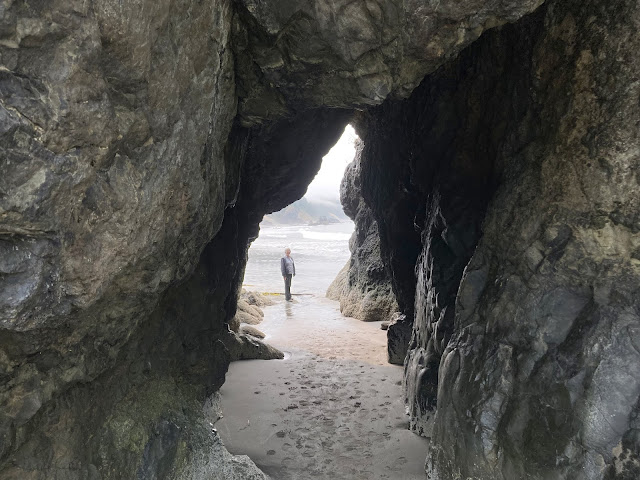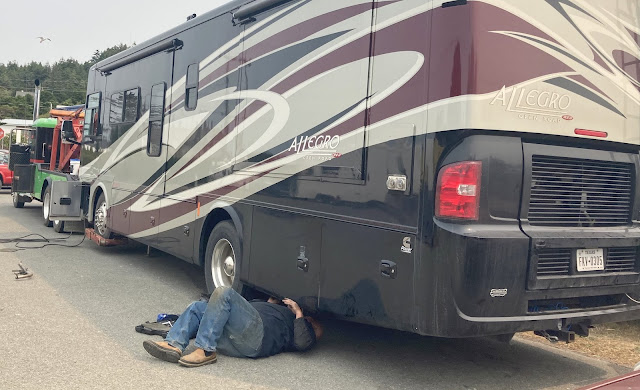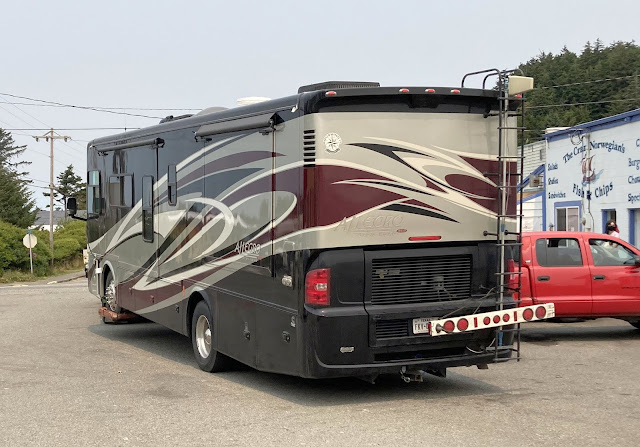Well, it's day #3 of being stranded in Port Orford because of motor home engine problems. We've been in Port Orford so long that we're beginning to feel like locals. We are now calling this stretch of beach just a block away as "our beach."
Denisa has made so many walks on this beach that it has become one of her favorites.
Some of these sea stars and anemones are beginning to look familiar.
We've been in Port Orford so long that she now knows where to look for the most bountiful views of sea creatures.
But she's still learning about her beach. For example, on this third day she found the usual green-tentacled anemones. But she also found some lower on the rock that were unusually pink.
That's her first time to find pink and green anemones.
We also found a couple different bright orange snails among the solid crust of earth-tone snails and barnacles.
We've been in Port Orford so long that we are beginning to recognize this salt-and-pepper sand as Port Orford sand.
While Mark has been saddled with most of the responsibility of our engine repair, he did take a walk on the beach with Denisa this third morning.
It was good to have him on the beach for pictures by these big sea stacks.
He's good at finding sea stack arches, and being bold to enter and check out their contents.
On this low tide morning, he noticed an arch that we can walk through.
We've been in Port Orford so long, we have learned you can walk through that entrance to get to a secret beach on the other side.
We just had to remember to get back through the opening before the tide came up again!
We've been in Port Orford so long that we found out about the team from Oregon State University that spends time here every summer. They are monitoring the whale population that passes through here on their migration north and south. One day we heard the yell, "We spotted a whale!" So Denisa hustled up to the tallest overlook where they were scanning the ocean. The team of four has been watching on this cliff for four weeks, and this was their very first whale sighting. They were very excited!
The team leader was watching through binoculars and making announcements like "Spout left of Miller's Islands heading east" and then there would be a flurry of movement as the guy with the video device tried to lock in on the sighting to give coordinates to the guy at the computer. Meanwhile, Denisa tried to figure out where Miller's Islands were in the cove where the two spotters were pointing their binoculars.
The next sightings were around #16 and then #17, the official names of two of the big rocks out there in the cove. This team had been practicing this routine for the past four weeks, and were excited at this first sighting. After the whale made its way out of the vicinity, Denisa chatted with the researchers. They take turns scanning the horizon for whales all day long. It is a pretty view, but they will tell you it gets mighty tiring after four weeks without a fin or a spout. Incidentally, don't look at the picture below too carefully hoping to see a whale. Since Denisa didn't know where to focus, we have no whale pictures today. But we've been in Port Orford so long that we feel like a local whale watcher hanging out with the research team.
Just 100 yards from our back bumper is this building without a sign to let us know what business they were in. But we've been in Port Orford so long that we now know they sell fresh fish. The first day was the first time they had tuna this season, and they announced it with a sign on Main Street. By the second day, they added the pink chalk "TUNA" on the road behind our motor home.
Since we are locals now, we know that you buy the entire fish for 50 cents per pound. For an added charge they will fillet it for you, and you can expect to lose about half the weight of your original purchase. Because we've been in Port Orford so long, we can tell you that this un-named fish market smelled more and more fishy each day as their load of tuna "matured."
There are also good berries on the walk to the port, and more towards the state park. Denisa has tasted enough wild blackberries straight off the vine in the past few days to know what the best-tasting ones look like. Within a bush, the berries change colors at different times, so that they all don't get ripe at once.
Even though the red or pink ones look tasty, they are not. We also read on the internet that blackberries won't ripen after they are picked. We've been in Port Orford so long that we know to pick only the black ones! Locals like us know they should look like this, and they make delicious cobbler and jelly!
While most of the bushes had some ripe berries, Denisa found a few late bushes that are still blooming.
We've been in Port Orford so long that Denisa also knows the best places to find the prettiest beach flowers. She thinks these are sweet peas, and they are lovely in the sand above the beach.
We've been in Port Orford so long that we've had to call the city police to ask special permission to stay overnight twice! While they were very sympathetic, the same wasn't true of our working neighbors. The lady in the flower shop (who we never saw wearing shoes these three days) and the girls working at the Crazy Norwegian Cafe were pretty tired of us by day three. One of them knocked on our door on day three to point out that we weren't allowed to park here overnight and we needed to leave. Mark very graciously apologized and pointed out that we couldn't leave. So we were very glad on day three to see our tow truck return. Now we just hope his hydraulics work!
Chris went right to work at getting us ready to tow while Mark stood by to help.
To get a diesel motor home ready to tow, you first have to cage the air brakes, and hook up an air supply from the tow truck to the motor home. Then you have to disconnect the drive shaft, and Denisa was a little unsettled to see them hoisting big pieces from her home.
The process takes over two hours, and Denisa tried real hard not to watch.
We've been in Port Orford so long that we expected a going away party as the tow truck pulled out of our parking place.
We followed it out of town in our pickup, and we were glad to see that they were taking the 51-mile trip slowly. When we got to a passing lane, we pulled around our home to go ahead to the diesel repair shop.
We've been in Port Orford so long that we were ready to leave. We wish we were leaving south instead of north, and we wish we were driving the motor home instead of being towed. But we're one step closer to getting this problem fixed and being back on the road.

































No comments:
Post a Comment